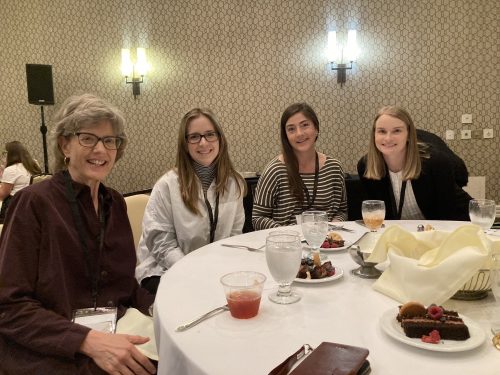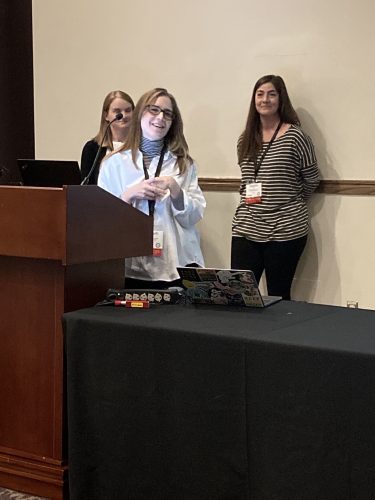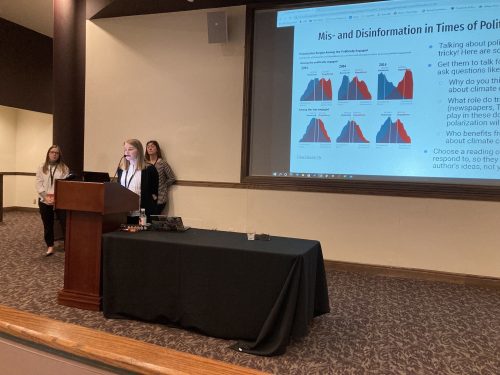This year, the LOEX annual conference was held in Ypsilanti, MI on May 5-7. LOEX is a non-profit educational clearinghouse for library instruction and information literacy information (LOEX used to stand for Library Orientation Exchange back when library orientation sessions were considered the main instructional format, now it is just LOEX). This year’s conference theme was We Can Do It: Retooling Library Instruction for Today’s Learning Environments, and it was the first in-person, post-Covid conference for LOEX. Four instruction librarians from ZSR share their conference experiences and reflections below.

Joy’s Reflections
Plenary Session: “Information as Experience: Propagandized Events and Online Information Literacy” by Mike Caulfield
I’m not sure how LOEX snagged Mike Caulfield to be this year’s plenary speaker, but I’m so grateful I had the opportunity to hear him speak in person and to get a glimpse of his latest thinking. For those of you who don’t know this award-winning information literacy rock star, Mike Caulfield is the director of blended and networked learning at Washington State University Vancouver and most famous for his development of the SIFT model of website reliability evaluation (Stop, Investigate the source, Find better coverage, Trace claims, quotes & media to the original content). Caulfield is the author of the Hapgood Blog, and when he writes and speaks, instruction librarians pay attention.
For his talk, Caulfield did not focus specifically on the SIFT model, but instead he focused on the emotional element of mis/dis-information source analysis. He said, “Far from a barrier to analysis, feeling is essential…your reaction isn’t the shovel, but it shows you where to dig.” He talked about feelings as “compellingness” and he said that compellingness is contextual. He said that if students don’t have an initial reaction to something, there is no interest in thinking critically about it. He showed the website Clean Food Facts which includes an ingredient guide for plant based foods. He explained that the site may look useful and even-handed, but a lateral search about the owner of this site finds that it is owned and created by a lobbying association for the hospitality industry. He said that it’s sometimes easier to fact-check something if it spurs emotion or feeling. If something is not naturally compelling, the instructor should give some context. On a personal note, I will say that I was delighted to hear Caulfield’s take on the importance of emotion in source evaluation–our gut reactions indicate what is important to us and triggers us to investigate reliability.
Breakout Session: “Just in Case: Utilizing Case Based Instruction to Teach Information Literacy” by Alyson Vaaler and Jillian Eslami, Texas A&M University
One of the best things about this year’s LOEX was the plethora of information offered. Almost every session I attended included a QR code to a Google Drive folder created just for that breakout session. In this session, the facilitators led an interactive session on using case studies to teach information literacy. Each table was given a different scenario, but through their Google Folder, attendees were given all of the scenarios used in the session (some of the scenarios got better reviews than others). I was reminded about the power of this teaching approach and I plan to implement more case studies in my classes in the fall. As a bonus, this session perfectly aligned with Mike Caulfield’s message that students need topics that are compelling and trigger a gut reaction.
Breakout Session: “The Building Blocks of Personalization: Breaking Down Algorithms & the Attention Economy” by Alexandria Chisholm, Penn State Berks
At Penn State Berks, Alexandria Chisholm teaches a workshop titled, “#For You: Algorithms & the Attention Economy.” In this breakout session, she walked through the entire lesson plan for that workshop. I was blown away by the presenter’s generosity. She provided handouts, but she also provided a link to her LibGuide for this workshop which includes a link to the workshop in the ACRL Framework for Information Literacy Sandbox. This interactive session was great fun! For one activity, she had us look at the details of how platforms personalize user experience. If you have any curiosity about this, I suggest you spend a couple of minutes reading about the Netflix Recommendation System. (Hint: notice that they are looking at “the time of day you watch, the devices you are watching Netflix on, and how long you watch.”) I hope to be able to use some of this material in our upcoming LIB290 Critical Information Literacy Course!
Amanda’s Reflections
This year’s LOEX was exciting because Elizabeth, Meghan, and myself presented on Misinformation, Algorithms, and Privacy: Helping Students Situate Information Literacy Issues Within Their Wider Social, Cultural, Political, and Technological Contexts (this links to our slides). We presented on the first day and received a lot of positive feedback for the rest of the conference from people who recognized us. It felt nice! 🙂


I always find it a bit difficult to focus on the conference when I’m also presenting (lots of nerves beforehand and relieved exhaustion when it’s over, haha), but I did attend several great sessions that were noteworthy. One that the others haven’t mentioned include Lane Wilkinson’s presentation on Social Media, the Public Sphere, and the Rhetoric of Source Evaluation, which I thought gave an excellent overview of how many of our writing colleagues teach rhetorical analysis to first year students (using the Rhetorical Triangle of ethos, logos, pathos) and how we can harness that in library instruction for source evaluation. Another one I found very useful was What Does ART Say? Creating an Annual Report of Teaching, which focused on creating meaningful instruction reporting (one of my goals is to create one of these for us this year!)
Elizabeth’s Reflection
Two of the breakout sessions that stuck with me the most were “Knocking down deficit teaching” by Jenn Sams & Dory Shaffer (Michigan Technological University) and “I am (not) Becky: Critically exploring whiteness and gender in higher education library instruction” by Rebecca Blunk (College of Southern Nevada). Although they were very different in content, one of the major themes they had in common was how our interactions and instruction in library spaces may be shaped by a ‘deficit’ approach. When we approach instruction and librarianship with a ‘deficit’ mindset, we see others as ‘lacking’ and ourselves as the ‘fixer.’ This mindset is usually motivated by a desire to be helpful, but as Sams and Shaffer cleverly demonstrated by asking instruction librarians to locate technical engineering materials that most of us had no experience with, it can hinder learning in the classroom by making students feel confused or embarrassed rather than tapping into their existing strengths and knowledge. Rather than framing instruction in terms of what students “can’t do,” it’s helpful to use what they already know and build upon it (asset-based pedagogy). Sams and Shaffer presented a framework for incorporating asset-based pedagogy into each lesson that includes open-ended questions that provide an opportunity to be surprised by students’ answers, giving students an opportunity to describe their current info ecosystem habits, and connecting examples and content to students’ existing knowledge.
In her talk on whiteness and gender in higher education library instruction Blunk pointed out that ‘Beckys,’ or ‘woke’ white women, may act out of a deficit mindset that can result in library spaces as neocolonial sites with the ‘Becky’ as a white savior and/or gatekeeper. Blunk suggested rethinking how we make presumptions about topics (are euro-centric topics valorized?), who and what we think of as scholarly or authoritative, and the predetermined searches that we use as demonstrations (consider relevancy and who they serve). To combat the ‘Becky’ mindset and the racial harm it can cause, Blunk suggests that white librarians engage with and incorporate multicultural pedagogy and critical whiteness studies, such as “The legacy of Lady Bountiful: White women in the library” by Gina Schlesselman-Tarango.
Meghan’s Reflection
I attended a session entitled “Collaborative Information Synthesis: Information Literacy Instruction for Group Projects” presented by Anne Diekema from Southern Utah University. She presented a very interesting instructional activity that provides a rich opportunity for group information synthesis. The activity is similar to a synthesis matrix assignment that I’ve incorporated in my LIB 100 courses, but it adapts this exercise to small group work and replicates the scholarship as conversation theme that we continuously reflect on in my LIB classes. I may try a similar activity in my upcoming courses this fall, especially to highlight the synthesis component of research for undergrad students.
Leah Morin from Michigan State University presented incorporating ethics of care, feminist pedagogy, and trauma-informed pedagogy in library instruction during her session “Handle with Care: Pandemic Teaching Habits We Can and Should Continue in Person”. She demonstrated exercises she uses to engage students in an affective domain for both virtual and face-to-face teaching modalities. It was a wonderful reminder of lessons we’ve learned from the past 2+ years of adapting to the pandemic on campus.
Additionally, it was wonderful to present with Amanda and Elizabeth at LOEX and engage with instruction librarians from across the country.





8 Comments on ‘LOEX 2022’
Congratulations all for a your presentation and an instructive conference!
Congrats on the presentation and many thanks for all these great links and ideas – I have so many tabs open after reading!
Excellent report! I very much appreciate the resources all of you shared. Congrats on a successful conference and presentation.
These sessions sound enriching on a personal level as well as a professional/teaching level. Thanks for sharing your Ypsi experiences and these resources!
Congratulations to all !
I feel that library instruction is in really good hands at ZSR
Sounds like y’all had a great time at LOEX! So happy you were able to present together too!
I’m always interested in the LOEX report! Thank you!
I’m so glad that you attended, presented, and received such enriching content at LOEX. I looked at your slides and now I want you to give this talk to all of us! Fascinating stuff. (I’m now thinking of deleting my Netflix account.)